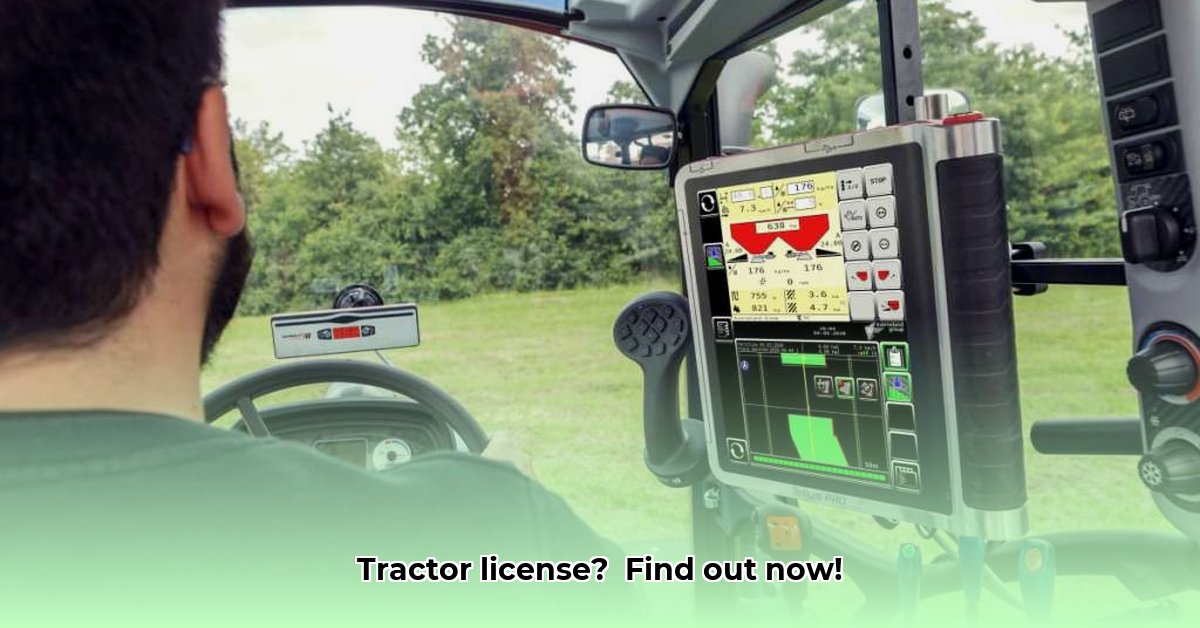
Need a license to operate a tractor? The answer isn't simple; it depends heavily on your location and where you're driving. This comprehensive guide clarifies state laws and essential safety practices for tractor operation.
Jurisdictional Variations: State-Specific Regulations
Tractor operation laws vary significantly across states. Some states require a standard driver's license for on-road use, while others mandate a commercial driver's license (CDL) or an agricultural vehicle endorsement. Even off-road operation might have age restrictions. The following table provides a general overview; however, it's crucial to verify this information with your state's Department of Motor Vehicles (DMV) or equivalent agency for the most up-to-date and accurate details.
| State | On-Road Requirements | Off-Road Requirements | Age Restrictions (On-Road/Off-Road) |
|---|---|---|---|
| California | Often requires a standard driver's license; specific requirements vary by vehicle weight and use. Check the DMV website. | Depends on local regulations; consult your county. | Typically 16+ / Varies |
| Texas | May require a special commercial driver's license (CDL), depending on the tractor's size and use. | Generally, no specific license required, but age restrictions may apply. | Usually 16+ / Varies |
| Iowa | May have exceptions for farmers driving short distances near their fields; check Iowa DOT regulations. | Varies; always check local government regulations for age and operational restrictions. | Typically 16+ / Varies |
| Florida | Specific regulations vary; always check the Florida DMV website for the most accurate information. | Local rules apply; consult your local authorities. | May vary; check Florida's licensing requirements. |
| New York | A standard driver's license might suffice, or a CDL may be mandated depending on tractor size and commercial use. | Local regulations may apply; check with your local authorities. | Check specific New York State requirements. |
Important Note: This table is for illustrative purposes. Always consult your state's official DMV website and relevant agricultural authorities for the most current and accurate information.
On-Road vs. Off-Road Operation: Legal Distinctions
Operating a tractor on private land typically has fewer regulations than on public roads. While a specific license may not be required, age restrictions might apply depending on local ordinances. However, safety precautions remain crucial. On public roads, however, strict adherence to traffic laws is mandatory. A driver's license (potentially a CDL) is usually required, and compliance with all traffic regulations is essential.
Do you have a large tractor capable of exceeding speed limits? How will you maintain safe control in various weather conditions? These are important questions to ask yourself before operating on public roads.
Safety Regulations: Prioritizing Safe Operation
Regardless of legal requirements, safe operation is paramount. Implementing these practices prevents accidents and protects both the operator and others:
- Slow-Moving Vehicle (SMV) Emblems: Use these highly visible emblems when operating on roadways to alert other drivers to your slow speed.
- Traffic Law Adherence: Follow all traffic laws, including speed limits, traffic signals, and right-of-way rules.
- Regular Tractor Maintenance: Regular inspections and maintenance are critical for preventing mechanical failures and ensuring safe operation.
- Safe Operating Procedures: Practice safe driving habits, avoid distractions, be aware of your surroundings, and operate defensively.
- Liability Insurance: Secure appropriate liability insurance to protect yourself financially in case of accidents. Failing to do so could leave you exposed to significant financial liability.
Finding Your State's Regulations: A Practical Guide
- Consult Your State's DMV Website: Begin by searching your state's Department of Motor Vehicles (DMV) website. They usually provide detailed information on licensing and agricultural vehicle regulations.
- Check Agricultural Extension Services: Your state's agricultural extension service may offer additional guidance and resources on tractor operation.
- Seek Legal Counsel: Consult an attorney specializing in agricultural law if you have complex circumstances or need clarification. This ensures legal compliance and minimizes risk.
Legal Consequences of Non-Compliance: Potential Penalties
Operating a tractor illegally can result in serious consequences. Penalties include substantial fines, license suspension, and even criminal charges in cases involving accidents or injuries. The severity of the penalties can be significant, emphasizing the importance of legal compliance. Have you considered the potential fines and legal fees associated with operating without the correct permits?
Conclusion: Safety and Legal Compliance
Understanding and adhering to your state's tractor operation laws and prioritizing safe operating practices are crucial. Remember, responsible operation protects both you and others. This guide provides a framework; always verify information with your state's official resources.